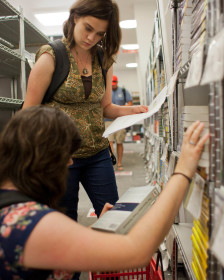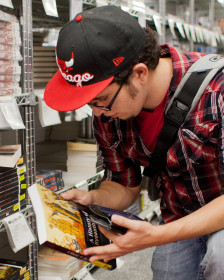
Rising side-by-side with tuition and student fees comes the ever-increasing cost of textbooks.
Shane Girton, associate director of the U’s Campus Store, said the average student pays about $500 to $600 solely on textbooks each semester. In his 15 years at the store, he’s seen a steady increase in the price of textbooks, unmatched by inflation.
“When I first started, having a book that was $150 was really expensive,” he said. “Now having a book that is $300 or more is expensive,” Girton said.
Girton attributes most of this to the competition from alternative textbook options, such as eBooks and rentals.
“With students being able to rent books and save 50 to 60 percent on a book that they can just rent, use during the semester and bring back, that’s where the biggest savings is,” he said.

The rental route for students has taken off in the last two to three years, and the Campus Store is keeping up with the trend; about 80 percent of their books are for rent. The store also offers many eBooks which can be up to 40 percent cheaper than a print book.
Girton said most students stick to the tradition of buying their own books with the hope of selling them back at the end of the semester. Stephanie Baird, a freshman in political science, opted to do that for most of her books this year, spending about $400 total.
“I have older siblings, so I was not quite shocked by the prices, but it is still a lot,” she said.
Some majors, such as business, engineering and the hard sciences, generally have more expensive textbooks. Because of the technical information and research that goes into putting each book together, publishers can keep prices high. For each textbook dollar sold, the Campus Store makes about 3.5 cents and the author makes a little over 11 cents. Most of the money goes to the publishers, who take 80 percent of the profits.

Many publishers make small changes each year in technical books to ensure that students will buy the newest, most expensive edition. The Campus Store works with professors to keep book prices low, encouraging them to use the same textbooks for as long as possible. The store also provides a “compare-and-save” section on their site so students can compare the prices of their books to other stores.
Though the Campus Store may lose money by doing this, Girton believes their primary purpose is to support the university’s educational mission.

“We’re here to provide course materials to students and do it in the most cost-efficient way possible,” he said. “There are opportunities for students to save money if they use the tools that are in front of them. That’s what we’re here for.”
c.webber@dailyutahchronicle.com
@carolyn_webber

